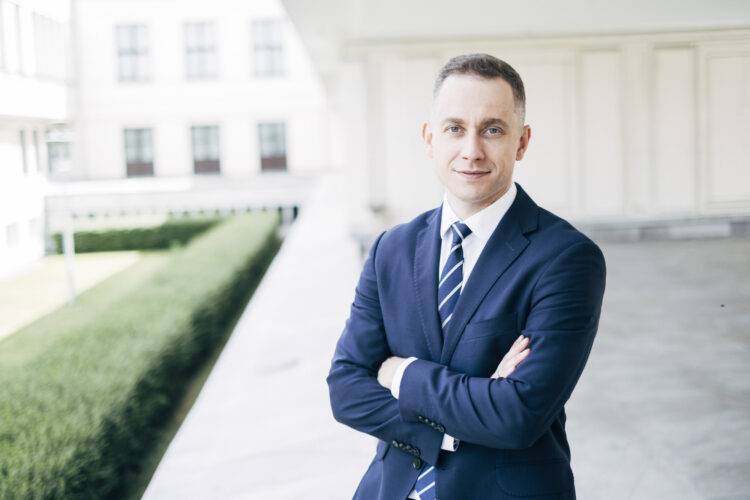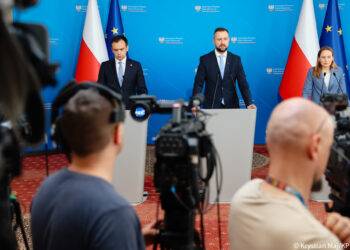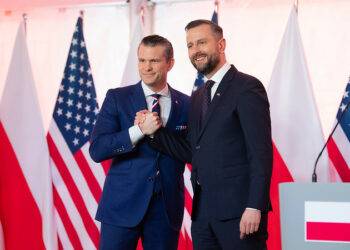Cezary Tomczyk, Poland’s Deputy Minister of Defense, heralded a new era of European awakening following strategic visits by Polish Prime Minister Donald Tusk to France and Germany. “Europe is awakening,” Tomczyk declared, underscoring the momentum gained from these high-level meetings that have spurred renewed interest and cooperation from both French and German military forces.
Tomczyk revealed that the immediate aftermath of Tusk’s diplomatic engagements saw a flurry of communications from the French and German armies, eager to embark on new projects previously stalled. This surge in collaborative defense initiatives marks a significant shift in Europe’s strategic posture, reflecting a continent more united in its approach to security and defense.
“After the visits of Prime Minister Tusk to France and Germany, and the foreign visits of Minister Sikorski and Minister Kosiniak-Kamysz, Europe is waking up,” stated the Deputy Minister of National Defence.
“The next day, we received calls from the French and German armies about the opening of new projects that could not be implemented before,” he emphasized.
Amidst talks of European security, Tomczyk touched on the notion of extending France’s nuclear umbrella over Poland, a proposal discussed by President Andrzej Duda with French President Emmanuel Macron. Emphasizing the criticality of such discussions within NATO’s framework, Tomczyk argued that nuclear security matters should be deliberated privately, underscoring the sensitivity and importance of these strategic dialogues.
Addressing the Visegrád Group’s (V4) relevance amidst these developments, Tomczyk acknowledged its importance while advocating for a reflective approach to its future functioning. He highlighted the group’s potential drift since 2015 due to populist governance but saw a chance for revitalization, signaling a hopeful outlook for this regional alliance.
- Follow us on X (Twitter) to stay up to date with News from Poland.
On the contentious issue of deploying NATO troops to Ukraine, Tomczyk firmly stated that no such plans are currently being considered within Poland. He advocated for discussions on security matters to remain confined to the strategic privacy of government offices, emphasizing the delicacy and complexity of such decisions.
Welcoming Sweden’s recent NATO accession, Tomczyk underscored its significant implications for regional security. “Sweden’s membership brings immense value, not just in terms of military hardware but also in enhancing the strategic depth of our collective defense,” he remarked, celebrating the expansion of NATO’s northern frontier.
“Sweden has a huge significance, not only from the perspective of their equipment quality, but all you have to do is look at the map. We have new allies today, Finland and Sweden, who will guard our security. We should be very pleased that countries that were fairly neutral in military matters until now, are today on the side of the biggest military alliance in the world.” – said Cezary Tomczyk.
Reiterating Poland’s leading role in defense spending relative to GDP within Europe, Tomczyk affirmed the nation’s readiness to augment its efforts in the face of potential armed conflict. This stance reinforces Poland’s commitment to maintaining a robust defensive posture amidst evolving security challenges.
– “We are the number one country in Europe when it comes to spending on security in relation to GDP. If Poland was realistically threatened with an armed conflict, of course, we would be able to do more.”
Cezary Tomczyk, Poland’s Deputy Minister of Defense, heralded a new era of European awakening following strategic visits by Polish Prime Minister Donald Tusk to France and Germany. “Europe is awakening,” Tomczyk declared, underscoring the momentum gained from these high-level meetings that have spurred renewed interest and cooperation from both French and German military forces.
Tomczyk revealed that the immediate aftermath of Tusk’s diplomatic engagements saw a flurry of communications from the French and German armies, eager to embark on new projects previously stalled. This surge in collaborative defense initiatives marks a significant shift in Europe’s strategic posture, reflecting a continent more united in its approach to security and defense.
“After the visits of Prime Minister Tusk to France and Germany, and the foreign visits of Minister Sikorski and Minister Kosiniak-Kamysz, Europe is waking up,” stated the Deputy Minister of National Defence.
“The next day, we received calls from the French and German armies about the opening of new projects that could not be implemented before,” he emphasized.
Amidst talks of European security, Tomczyk touched on the notion of extending France’s nuclear umbrella over Poland, a proposal discussed by President Andrzej Duda with French President Emmanuel Macron. Emphasizing the criticality of such discussions within NATO’s framework, Tomczyk argued that nuclear security matters should be deliberated privately, underscoring the sensitivity and importance of these strategic dialogues.
Addressing the Visegrád Group’s (V4) relevance amidst these developments, Tomczyk acknowledged its importance while advocating for a reflective approach to its future functioning. He highlighted the group’s potential drift since 2015 due to populist governance but saw a chance for revitalization, signaling a hopeful outlook for this regional alliance.
- Follow us on X (Twitter) to stay up to date with News from Poland.
On the contentious issue of deploying NATO troops to Ukraine, Tomczyk firmly stated that no such plans are currently being considered within Poland. He advocated for discussions on security matters to remain confined to the strategic privacy of government offices, emphasizing the delicacy and complexity of such decisions.
Welcoming Sweden’s recent NATO accession, Tomczyk underscored its significant implications for regional security. “Sweden’s membership brings immense value, not just in terms of military hardware but also in enhancing the strategic depth of our collective defense,” he remarked, celebrating the expansion of NATO’s northern frontier.
“Sweden has a huge significance, not only from the perspective of their equipment quality, but all you have to do is look at the map. We have new allies today, Finland and Sweden, who will guard our security. We should be very pleased that countries that were fairly neutral in military matters until now, are today on the side of the biggest military alliance in the world.” – said Cezary Tomczyk.
Reiterating Poland’s leading role in defense spending relative to GDP within Europe, Tomczyk affirmed the nation’s readiness to augment its efforts in the face of potential armed conflict. This stance reinforces Poland’s commitment to maintaining a robust defensive posture amidst evolving security challenges.
– “We are the number one country in Europe when it comes to spending on security in relation to GDP. If Poland was realistically threatened with an armed conflict, of course, we would be able to do more.”
Cezary Tomczyk, Poland’s Deputy Minister of Defense, heralded a new era of European awakening following strategic visits by Polish Prime Minister Donald Tusk to France and Germany. “Europe is awakening,” Tomczyk declared, underscoring the momentum gained from these high-level meetings that have spurred renewed interest and cooperation from both French and German military forces.
Tomczyk revealed that the immediate aftermath of Tusk’s diplomatic engagements saw a flurry of communications from the French and German armies, eager to embark on new projects previously stalled. This surge in collaborative defense initiatives marks a significant shift in Europe’s strategic posture, reflecting a continent more united in its approach to security and defense.
“After the visits of Prime Minister Tusk to France and Germany, and the foreign visits of Minister Sikorski and Minister Kosiniak-Kamysz, Europe is waking up,” stated the Deputy Minister of National Defence.
“The next day, we received calls from the French and German armies about the opening of new projects that could not be implemented before,” he emphasized.
Amidst talks of European security, Tomczyk touched on the notion of extending France’s nuclear umbrella over Poland, a proposal discussed by President Andrzej Duda with French President Emmanuel Macron. Emphasizing the criticality of such discussions within NATO’s framework, Tomczyk argued that nuclear security matters should be deliberated privately, underscoring the sensitivity and importance of these strategic dialogues.
Addressing the Visegrád Group’s (V4) relevance amidst these developments, Tomczyk acknowledged its importance while advocating for a reflective approach to its future functioning. He highlighted the group’s potential drift since 2015 due to populist governance but saw a chance for revitalization, signaling a hopeful outlook for this regional alliance.
- Follow us on X (Twitter) to stay up to date with News from Poland.
On the contentious issue of deploying NATO troops to Ukraine, Tomczyk firmly stated that no such plans are currently being considered within Poland. He advocated for discussions on security matters to remain confined to the strategic privacy of government offices, emphasizing the delicacy and complexity of such decisions.
Welcoming Sweden’s recent NATO accession, Tomczyk underscored its significant implications for regional security. “Sweden’s membership brings immense value, not just in terms of military hardware but also in enhancing the strategic depth of our collective defense,” he remarked, celebrating the expansion of NATO’s northern frontier.
“Sweden has a huge significance, not only from the perspective of their equipment quality, but all you have to do is look at the map. We have new allies today, Finland and Sweden, who will guard our security. We should be very pleased that countries that were fairly neutral in military matters until now, are today on the side of the biggest military alliance in the world.” – said Cezary Tomczyk.
Reiterating Poland’s leading role in defense spending relative to GDP within Europe, Tomczyk affirmed the nation’s readiness to augment its efforts in the face of potential armed conflict. This stance reinforces Poland’s commitment to maintaining a robust defensive posture amidst evolving security challenges.
– “We are the number one country in Europe when it comes to spending on security in relation to GDP. If Poland was realistically threatened with an armed conflict, of course, we would be able to do more.”
Cezary Tomczyk, Poland’s Deputy Minister of Defense, heralded a new era of European awakening following strategic visits by Polish Prime Minister Donald Tusk to France and Germany. “Europe is awakening,” Tomczyk declared, underscoring the momentum gained from these high-level meetings that have spurred renewed interest and cooperation from both French and German military forces.
Tomczyk revealed that the immediate aftermath of Tusk’s diplomatic engagements saw a flurry of communications from the French and German armies, eager to embark on new projects previously stalled. This surge in collaborative defense initiatives marks a significant shift in Europe’s strategic posture, reflecting a continent more united in its approach to security and defense.
“After the visits of Prime Minister Tusk to France and Germany, and the foreign visits of Minister Sikorski and Minister Kosiniak-Kamysz, Europe is waking up,” stated the Deputy Minister of National Defence.
“The next day, we received calls from the French and German armies about the opening of new projects that could not be implemented before,” he emphasized.
Amidst talks of European security, Tomczyk touched on the notion of extending France’s nuclear umbrella over Poland, a proposal discussed by President Andrzej Duda with French President Emmanuel Macron. Emphasizing the criticality of such discussions within NATO’s framework, Tomczyk argued that nuclear security matters should be deliberated privately, underscoring the sensitivity and importance of these strategic dialogues.
Addressing the Visegrád Group’s (V4) relevance amidst these developments, Tomczyk acknowledged its importance while advocating for a reflective approach to its future functioning. He highlighted the group’s potential drift since 2015 due to populist governance but saw a chance for revitalization, signaling a hopeful outlook for this regional alliance.
- Follow us on X (Twitter) to stay up to date with News from Poland.
On the contentious issue of deploying NATO troops to Ukraine, Tomczyk firmly stated that no such plans are currently being considered within Poland. He advocated for discussions on security matters to remain confined to the strategic privacy of government offices, emphasizing the delicacy and complexity of such decisions.
Welcoming Sweden’s recent NATO accession, Tomczyk underscored its significant implications for regional security. “Sweden’s membership brings immense value, not just in terms of military hardware but also in enhancing the strategic depth of our collective defense,” he remarked, celebrating the expansion of NATO’s northern frontier.
“Sweden has a huge significance, not only from the perspective of their equipment quality, but all you have to do is look at the map. We have new allies today, Finland and Sweden, who will guard our security. We should be very pleased that countries that were fairly neutral in military matters until now, are today on the side of the biggest military alliance in the world.” – said Cezary Tomczyk.
Reiterating Poland’s leading role in defense spending relative to GDP within Europe, Tomczyk affirmed the nation’s readiness to augment its efforts in the face of potential armed conflict. This stance reinforces Poland’s commitment to maintaining a robust defensive posture amidst evolving security challenges.
– “We are the number one country in Europe when it comes to spending on security in relation to GDP. If Poland was realistically threatened with an armed conflict, of course, we would be able to do more.”
Cezary Tomczyk, Poland’s Deputy Minister of Defense, heralded a new era of European awakening following strategic visits by Polish Prime Minister Donald Tusk to France and Germany. “Europe is awakening,” Tomczyk declared, underscoring the momentum gained from these high-level meetings that have spurred renewed interest and cooperation from both French and German military forces.
Tomczyk revealed that the immediate aftermath of Tusk’s diplomatic engagements saw a flurry of communications from the French and German armies, eager to embark on new projects previously stalled. This surge in collaborative defense initiatives marks a significant shift in Europe’s strategic posture, reflecting a continent more united in its approach to security and defense.
“After the visits of Prime Minister Tusk to France and Germany, and the foreign visits of Minister Sikorski and Minister Kosiniak-Kamysz, Europe is waking up,” stated the Deputy Minister of National Defence.
“The next day, we received calls from the French and German armies about the opening of new projects that could not be implemented before,” he emphasized.
Amidst talks of European security, Tomczyk touched on the notion of extending France’s nuclear umbrella over Poland, a proposal discussed by President Andrzej Duda with French President Emmanuel Macron. Emphasizing the criticality of such discussions within NATO’s framework, Tomczyk argued that nuclear security matters should be deliberated privately, underscoring the sensitivity and importance of these strategic dialogues.
Addressing the Visegrád Group’s (V4) relevance amidst these developments, Tomczyk acknowledged its importance while advocating for a reflective approach to its future functioning. He highlighted the group’s potential drift since 2015 due to populist governance but saw a chance for revitalization, signaling a hopeful outlook for this regional alliance.
- Follow us on X (Twitter) to stay up to date with News from Poland.
On the contentious issue of deploying NATO troops to Ukraine, Tomczyk firmly stated that no such plans are currently being considered within Poland. He advocated for discussions on security matters to remain confined to the strategic privacy of government offices, emphasizing the delicacy and complexity of such decisions.
Welcoming Sweden’s recent NATO accession, Tomczyk underscored its significant implications for regional security. “Sweden’s membership brings immense value, not just in terms of military hardware but also in enhancing the strategic depth of our collective defense,” he remarked, celebrating the expansion of NATO’s northern frontier.
“Sweden has a huge significance, not only from the perspective of their equipment quality, but all you have to do is look at the map. We have new allies today, Finland and Sweden, who will guard our security. We should be very pleased that countries that were fairly neutral in military matters until now, are today on the side of the biggest military alliance in the world.” – said Cezary Tomczyk.
Reiterating Poland’s leading role in defense spending relative to GDP within Europe, Tomczyk affirmed the nation’s readiness to augment its efforts in the face of potential armed conflict. This stance reinforces Poland’s commitment to maintaining a robust defensive posture amidst evolving security challenges.
– “We are the number one country in Europe when it comes to spending on security in relation to GDP. If Poland was realistically threatened with an armed conflict, of course, we would be able to do more.”
Cezary Tomczyk, Poland’s Deputy Minister of Defense, heralded a new era of European awakening following strategic visits by Polish Prime Minister Donald Tusk to France and Germany. “Europe is awakening,” Tomczyk declared, underscoring the momentum gained from these high-level meetings that have spurred renewed interest and cooperation from both French and German military forces.
Tomczyk revealed that the immediate aftermath of Tusk’s diplomatic engagements saw a flurry of communications from the French and German armies, eager to embark on new projects previously stalled. This surge in collaborative defense initiatives marks a significant shift in Europe’s strategic posture, reflecting a continent more united in its approach to security and defense.
“After the visits of Prime Minister Tusk to France and Germany, and the foreign visits of Minister Sikorski and Minister Kosiniak-Kamysz, Europe is waking up,” stated the Deputy Minister of National Defence.
“The next day, we received calls from the French and German armies about the opening of new projects that could not be implemented before,” he emphasized.
Amidst talks of European security, Tomczyk touched on the notion of extending France’s nuclear umbrella over Poland, a proposal discussed by President Andrzej Duda with French President Emmanuel Macron. Emphasizing the criticality of such discussions within NATO’s framework, Tomczyk argued that nuclear security matters should be deliberated privately, underscoring the sensitivity and importance of these strategic dialogues.
Addressing the Visegrád Group’s (V4) relevance amidst these developments, Tomczyk acknowledged its importance while advocating for a reflective approach to its future functioning. He highlighted the group’s potential drift since 2015 due to populist governance but saw a chance for revitalization, signaling a hopeful outlook for this regional alliance.
- Follow us on X (Twitter) to stay up to date with News from Poland.
On the contentious issue of deploying NATO troops to Ukraine, Tomczyk firmly stated that no such plans are currently being considered within Poland. He advocated for discussions on security matters to remain confined to the strategic privacy of government offices, emphasizing the delicacy and complexity of such decisions.
Welcoming Sweden’s recent NATO accession, Tomczyk underscored its significant implications for regional security. “Sweden’s membership brings immense value, not just in terms of military hardware but also in enhancing the strategic depth of our collective defense,” he remarked, celebrating the expansion of NATO’s northern frontier.
“Sweden has a huge significance, not only from the perspective of their equipment quality, but all you have to do is look at the map. We have new allies today, Finland and Sweden, who will guard our security. We should be very pleased that countries that were fairly neutral in military matters until now, are today on the side of the biggest military alliance in the world.” – said Cezary Tomczyk.
Reiterating Poland’s leading role in defense spending relative to GDP within Europe, Tomczyk affirmed the nation’s readiness to augment its efforts in the face of potential armed conflict. This stance reinforces Poland’s commitment to maintaining a robust defensive posture amidst evolving security challenges.
– “We are the number one country in Europe when it comes to spending on security in relation to GDP. If Poland was realistically threatened with an armed conflict, of course, we would be able to do more.”
Cezary Tomczyk, Poland’s Deputy Minister of Defense, heralded a new era of European awakening following strategic visits by Polish Prime Minister Donald Tusk to France and Germany. “Europe is awakening,” Tomczyk declared, underscoring the momentum gained from these high-level meetings that have spurred renewed interest and cooperation from both French and German military forces.
Tomczyk revealed that the immediate aftermath of Tusk’s diplomatic engagements saw a flurry of communications from the French and German armies, eager to embark on new projects previously stalled. This surge in collaborative defense initiatives marks a significant shift in Europe’s strategic posture, reflecting a continent more united in its approach to security and defense.
“After the visits of Prime Minister Tusk to France and Germany, and the foreign visits of Minister Sikorski and Minister Kosiniak-Kamysz, Europe is waking up,” stated the Deputy Minister of National Defence.
“The next day, we received calls from the French and German armies about the opening of new projects that could not be implemented before,” he emphasized.
Amidst talks of European security, Tomczyk touched on the notion of extending France’s nuclear umbrella over Poland, a proposal discussed by President Andrzej Duda with French President Emmanuel Macron. Emphasizing the criticality of such discussions within NATO’s framework, Tomczyk argued that nuclear security matters should be deliberated privately, underscoring the sensitivity and importance of these strategic dialogues.
Addressing the Visegrád Group’s (V4) relevance amidst these developments, Tomczyk acknowledged its importance while advocating for a reflective approach to its future functioning. He highlighted the group’s potential drift since 2015 due to populist governance but saw a chance for revitalization, signaling a hopeful outlook for this regional alliance.
- Follow us on X (Twitter) to stay up to date with News from Poland.
On the contentious issue of deploying NATO troops to Ukraine, Tomczyk firmly stated that no such plans are currently being considered within Poland. He advocated for discussions on security matters to remain confined to the strategic privacy of government offices, emphasizing the delicacy and complexity of such decisions.
Welcoming Sweden’s recent NATO accession, Tomczyk underscored its significant implications for regional security. “Sweden’s membership brings immense value, not just in terms of military hardware but also in enhancing the strategic depth of our collective defense,” he remarked, celebrating the expansion of NATO’s northern frontier.
“Sweden has a huge significance, not only from the perspective of their equipment quality, but all you have to do is look at the map. We have new allies today, Finland and Sweden, who will guard our security. We should be very pleased that countries that were fairly neutral in military matters until now, are today on the side of the biggest military alliance in the world.” – said Cezary Tomczyk.
Reiterating Poland’s leading role in defense spending relative to GDP within Europe, Tomczyk affirmed the nation’s readiness to augment its efforts in the face of potential armed conflict. This stance reinforces Poland’s commitment to maintaining a robust defensive posture amidst evolving security challenges.
– “We are the number one country in Europe when it comes to spending on security in relation to GDP. If Poland was realistically threatened with an armed conflict, of course, we would be able to do more.”
Cezary Tomczyk, Poland’s Deputy Minister of Defense, heralded a new era of European awakening following strategic visits by Polish Prime Minister Donald Tusk to France and Germany. “Europe is awakening,” Tomczyk declared, underscoring the momentum gained from these high-level meetings that have spurred renewed interest and cooperation from both French and German military forces.
Tomczyk revealed that the immediate aftermath of Tusk’s diplomatic engagements saw a flurry of communications from the French and German armies, eager to embark on new projects previously stalled. This surge in collaborative defense initiatives marks a significant shift in Europe’s strategic posture, reflecting a continent more united in its approach to security and defense.
“After the visits of Prime Minister Tusk to France and Germany, and the foreign visits of Minister Sikorski and Minister Kosiniak-Kamysz, Europe is waking up,” stated the Deputy Minister of National Defence.
“The next day, we received calls from the French and German armies about the opening of new projects that could not be implemented before,” he emphasized.
Amidst talks of European security, Tomczyk touched on the notion of extending France’s nuclear umbrella over Poland, a proposal discussed by President Andrzej Duda with French President Emmanuel Macron. Emphasizing the criticality of such discussions within NATO’s framework, Tomczyk argued that nuclear security matters should be deliberated privately, underscoring the sensitivity and importance of these strategic dialogues.
Addressing the Visegrád Group’s (V4) relevance amidst these developments, Tomczyk acknowledged its importance while advocating for a reflective approach to its future functioning. He highlighted the group’s potential drift since 2015 due to populist governance but saw a chance for revitalization, signaling a hopeful outlook for this regional alliance.
- Follow us on X (Twitter) to stay up to date with News from Poland.
On the contentious issue of deploying NATO troops to Ukraine, Tomczyk firmly stated that no such plans are currently being considered within Poland. He advocated for discussions on security matters to remain confined to the strategic privacy of government offices, emphasizing the delicacy and complexity of such decisions.
Welcoming Sweden’s recent NATO accession, Tomczyk underscored its significant implications for regional security. “Sweden’s membership brings immense value, not just in terms of military hardware but also in enhancing the strategic depth of our collective defense,” he remarked, celebrating the expansion of NATO’s northern frontier.
“Sweden has a huge significance, not only from the perspective of their equipment quality, but all you have to do is look at the map. We have new allies today, Finland and Sweden, who will guard our security. We should be very pleased that countries that were fairly neutral in military matters until now, are today on the side of the biggest military alliance in the world.” – said Cezary Tomczyk.
Reiterating Poland’s leading role in defense spending relative to GDP within Europe, Tomczyk affirmed the nation’s readiness to augment its efforts in the face of potential armed conflict. This stance reinforces Poland’s commitment to maintaining a robust defensive posture amidst evolving security challenges.
– “We are the number one country in Europe when it comes to spending on security in relation to GDP. If Poland was realistically threatened with an armed conflict, of course, we would be able to do more.”
Cezary Tomczyk, Poland’s Deputy Minister of Defense, heralded a new era of European awakening following strategic visits by Polish Prime Minister Donald Tusk to France and Germany. “Europe is awakening,” Tomczyk declared, underscoring the momentum gained from these high-level meetings that have spurred renewed interest and cooperation from both French and German military forces.
Tomczyk revealed that the immediate aftermath of Tusk’s diplomatic engagements saw a flurry of communications from the French and German armies, eager to embark on new projects previously stalled. This surge in collaborative defense initiatives marks a significant shift in Europe’s strategic posture, reflecting a continent more united in its approach to security and defense.
“After the visits of Prime Minister Tusk to France and Germany, and the foreign visits of Minister Sikorski and Minister Kosiniak-Kamysz, Europe is waking up,” stated the Deputy Minister of National Defence.
“The next day, we received calls from the French and German armies about the opening of new projects that could not be implemented before,” he emphasized.
Amidst talks of European security, Tomczyk touched on the notion of extending France’s nuclear umbrella over Poland, a proposal discussed by President Andrzej Duda with French President Emmanuel Macron. Emphasizing the criticality of such discussions within NATO’s framework, Tomczyk argued that nuclear security matters should be deliberated privately, underscoring the sensitivity and importance of these strategic dialogues.
Addressing the Visegrád Group’s (V4) relevance amidst these developments, Tomczyk acknowledged its importance while advocating for a reflective approach to its future functioning. He highlighted the group’s potential drift since 2015 due to populist governance but saw a chance for revitalization, signaling a hopeful outlook for this regional alliance.
- Follow us on X (Twitter) to stay up to date with News from Poland.
On the contentious issue of deploying NATO troops to Ukraine, Tomczyk firmly stated that no such plans are currently being considered within Poland. He advocated for discussions on security matters to remain confined to the strategic privacy of government offices, emphasizing the delicacy and complexity of such decisions.
Welcoming Sweden’s recent NATO accession, Tomczyk underscored its significant implications for regional security. “Sweden’s membership brings immense value, not just in terms of military hardware but also in enhancing the strategic depth of our collective defense,” he remarked, celebrating the expansion of NATO’s northern frontier.
“Sweden has a huge significance, not only from the perspective of their equipment quality, but all you have to do is look at the map. We have new allies today, Finland and Sweden, who will guard our security. We should be very pleased that countries that were fairly neutral in military matters until now, are today on the side of the biggest military alliance in the world.” – said Cezary Tomczyk.
Reiterating Poland’s leading role in defense spending relative to GDP within Europe, Tomczyk affirmed the nation’s readiness to augment its efforts in the face of potential armed conflict. This stance reinforces Poland’s commitment to maintaining a robust defensive posture amidst evolving security challenges.
– “We are the number one country in Europe when it comes to spending on security in relation to GDP. If Poland was realistically threatened with an armed conflict, of course, we would be able to do more.”
Cezary Tomczyk, Poland’s Deputy Minister of Defense, heralded a new era of European awakening following strategic visits by Polish Prime Minister Donald Tusk to France and Germany. “Europe is awakening,” Tomczyk declared, underscoring the momentum gained from these high-level meetings that have spurred renewed interest and cooperation from both French and German military forces.
Tomczyk revealed that the immediate aftermath of Tusk’s diplomatic engagements saw a flurry of communications from the French and German armies, eager to embark on new projects previously stalled. This surge in collaborative defense initiatives marks a significant shift in Europe’s strategic posture, reflecting a continent more united in its approach to security and defense.
“After the visits of Prime Minister Tusk to France and Germany, and the foreign visits of Minister Sikorski and Minister Kosiniak-Kamysz, Europe is waking up,” stated the Deputy Minister of National Defence.
“The next day, we received calls from the French and German armies about the opening of new projects that could not be implemented before,” he emphasized.
Amidst talks of European security, Tomczyk touched on the notion of extending France’s nuclear umbrella over Poland, a proposal discussed by President Andrzej Duda with French President Emmanuel Macron. Emphasizing the criticality of such discussions within NATO’s framework, Tomczyk argued that nuclear security matters should be deliberated privately, underscoring the sensitivity and importance of these strategic dialogues.
Addressing the Visegrád Group’s (V4) relevance amidst these developments, Tomczyk acknowledged its importance while advocating for a reflective approach to its future functioning. He highlighted the group’s potential drift since 2015 due to populist governance but saw a chance for revitalization, signaling a hopeful outlook for this regional alliance.
- Follow us on X (Twitter) to stay up to date with News from Poland.
On the contentious issue of deploying NATO troops to Ukraine, Tomczyk firmly stated that no such plans are currently being considered within Poland. He advocated for discussions on security matters to remain confined to the strategic privacy of government offices, emphasizing the delicacy and complexity of such decisions.
Welcoming Sweden’s recent NATO accession, Tomczyk underscored its significant implications for regional security. “Sweden’s membership brings immense value, not just in terms of military hardware but also in enhancing the strategic depth of our collective defense,” he remarked, celebrating the expansion of NATO’s northern frontier.
“Sweden has a huge significance, not only from the perspective of their equipment quality, but all you have to do is look at the map. We have new allies today, Finland and Sweden, who will guard our security. We should be very pleased that countries that were fairly neutral in military matters until now, are today on the side of the biggest military alliance in the world.” – said Cezary Tomczyk.
Reiterating Poland’s leading role in defense spending relative to GDP within Europe, Tomczyk affirmed the nation’s readiness to augment its efforts in the face of potential armed conflict. This stance reinforces Poland’s commitment to maintaining a robust defensive posture amidst evolving security challenges.
– “We are the number one country in Europe when it comes to spending on security in relation to GDP. If Poland was realistically threatened with an armed conflict, of course, we would be able to do more.”
Cezary Tomczyk, Poland’s Deputy Minister of Defense, heralded a new era of European awakening following strategic visits by Polish Prime Minister Donald Tusk to France and Germany. “Europe is awakening,” Tomczyk declared, underscoring the momentum gained from these high-level meetings that have spurred renewed interest and cooperation from both French and German military forces.
Tomczyk revealed that the immediate aftermath of Tusk’s diplomatic engagements saw a flurry of communications from the French and German armies, eager to embark on new projects previously stalled. This surge in collaborative defense initiatives marks a significant shift in Europe’s strategic posture, reflecting a continent more united in its approach to security and defense.
“After the visits of Prime Minister Tusk to France and Germany, and the foreign visits of Minister Sikorski and Minister Kosiniak-Kamysz, Europe is waking up,” stated the Deputy Minister of National Defence.
“The next day, we received calls from the French and German armies about the opening of new projects that could not be implemented before,” he emphasized.
Amidst talks of European security, Tomczyk touched on the notion of extending France’s nuclear umbrella over Poland, a proposal discussed by President Andrzej Duda with French President Emmanuel Macron. Emphasizing the criticality of such discussions within NATO’s framework, Tomczyk argued that nuclear security matters should be deliberated privately, underscoring the sensitivity and importance of these strategic dialogues.
Addressing the Visegrád Group’s (V4) relevance amidst these developments, Tomczyk acknowledged its importance while advocating for a reflective approach to its future functioning. He highlighted the group’s potential drift since 2015 due to populist governance but saw a chance for revitalization, signaling a hopeful outlook for this regional alliance.
- Follow us on X (Twitter) to stay up to date with News from Poland.
On the contentious issue of deploying NATO troops to Ukraine, Tomczyk firmly stated that no such plans are currently being considered within Poland. He advocated for discussions on security matters to remain confined to the strategic privacy of government offices, emphasizing the delicacy and complexity of such decisions.
Welcoming Sweden’s recent NATO accession, Tomczyk underscored its significant implications for regional security. “Sweden’s membership brings immense value, not just in terms of military hardware but also in enhancing the strategic depth of our collective defense,” he remarked, celebrating the expansion of NATO’s northern frontier.
“Sweden has a huge significance, not only from the perspective of their equipment quality, but all you have to do is look at the map. We have new allies today, Finland and Sweden, who will guard our security. We should be very pleased that countries that were fairly neutral in military matters until now, are today on the side of the biggest military alliance in the world.” – said Cezary Tomczyk.
Reiterating Poland’s leading role in defense spending relative to GDP within Europe, Tomczyk affirmed the nation’s readiness to augment its efforts in the face of potential armed conflict. This stance reinforces Poland’s commitment to maintaining a robust defensive posture amidst evolving security challenges.
– “We are the number one country in Europe when it comes to spending on security in relation to GDP. If Poland was realistically threatened with an armed conflict, of course, we would be able to do more.”
Cezary Tomczyk, Poland’s Deputy Minister of Defense, heralded a new era of European awakening following strategic visits by Polish Prime Minister Donald Tusk to France and Germany. “Europe is awakening,” Tomczyk declared, underscoring the momentum gained from these high-level meetings that have spurred renewed interest and cooperation from both French and German military forces.
Tomczyk revealed that the immediate aftermath of Tusk’s diplomatic engagements saw a flurry of communications from the French and German armies, eager to embark on new projects previously stalled. This surge in collaborative defense initiatives marks a significant shift in Europe’s strategic posture, reflecting a continent more united in its approach to security and defense.
“After the visits of Prime Minister Tusk to France and Germany, and the foreign visits of Minister Sikorski and Minister Kosiniak-Kamysz, Europe is waking up,” stated the Deputy Minister of National Defence.
“The next day, we received calls from the French and German armies about the opening of new projects that could not be implemented before,” he emphasized.
Amidst talks of European security, Tomczyk touched on the notion of extending France’s nuclear umbrella over Poland, a proposal discussed by President Andrzej Duda with French President Emmanuel Macron. Emphasizing the criticality of such discussions within NATO’s framework, Tomczyk argued that nuclear security matters should be deliberated privately, underscoring the sensitivity and importance of these strategic dialogues.
Addressing the Visegrád Group’s (V4) relevance amidst these developments, Tomczyk acknowledged its importance while advocating for a reflective approach to its future functioning. He highlighted the group’s potential drift since 2015 due to populist governance but saw a chance for revitalization, signaling a hopeful outlook for this regional alliance.
- Follow us on X (Twitter) to stay up to date with News from Poland.
On the contentious issue of deploying NATO troops to Ukraine, Tomczyk firmly stated that no such plans are currently being considered within Poland. He advocated for discussions on security matters to remain confined to the strategic privacy of government offices, emphasizing the delicacy and complexity of such decisions.
Welcoming Sweden’s recent NATO accession, Tomczyk underscored its significant implications for regional security. “Sweden’s membership brings immense value, not just in terms of military hardware but also in enhancing the strategic depth of our collective defense,” he remarked, celebrating the expansion of NATO’s northern frontier.
“Sweden has a huge significance, not only from the perspective of their equipment quality, but all you have to do is look at the map. We have new allies today, Finland and Sweden, who will guard our security. We should be very pleased that countries that were fairly neutral in military matters until now, are today on the side of the biggest military alliance in the world.” – said Cezary Tomczyk.
Reiterating Poland’s leading role in defense spending relative to GDP within Europe, Tomczyk affirmed the nation’s readiness to augment its efforts in the face of potential armed conflict. This stance reinforces Poland’s commitment to maintaining a robust defensive posture amidst evolving security challenges.
– “We are the number one country in Europe when it comes to spending on security in relation to GDP. If Poland was realistically threatened with an armed conflict, of course, we would be able to do more.”
Cezary Tomczyk, Poland’s Deputy Minister of Defense, heralded a new era of European awakening following strategic visits by Polish Prime Minister Donald Tusk to France and Germany. “Europe is awakening,” Tomczyk declared, underscoring the momentum gained from these high-level meetings that have spurred renewed interest and cooperation from both French and German military forces.
Tomczyk revealed that the immediate aftermath of Tusk’s diplomatic engagements saw a flurry of communications from the French and German armies, eager to embark on new projects previously stalled. This surge in collaborative defense initiatives marks a significant shift in Europe’s strategic posture, reflecting a continent more united in its approach to security and defense.
“After the visits of Prime Minister Tusk to France and Germany, and the foreign visits of Minister Sikorski and Minister Kosiniak-Kamysz, Europe is waking up,” stated the Deputy Minister of National Defence.
“The next day, we received calls from the French and German armies about the opening of new projects that could not be implemented before,” he emphasized.
Amidst talks of European security, Tomczyk touched on the notion of extending France’s nuclear umbrella over Poland, a proposal discussed by President Andrzej Duda with French President Emmanuel Macron. Emphasizing the criticality of such discussions within NATO’s framework, Tomczyk argued that nuclear security matters should be deliberated privately, underscoring the sensitivity and importance of these strategic dialogues.
Addressing the Visegrád Group’s (V4) relevance amidst these developments, Tomczyk acknowledged its importance while advocating for a reflective approach to its future functioning. He highlighted the group’s potential drift since 2015 due to populist governance but saw a chance for revitalization, signaling a hopeful outlook for this regional alliance.
- Follow us on X (Twitter) to stay up to date with News from Poland.
On the contentious issue of deploying NATO troops to Ukraine, Tomczyk firmly stated that no such plans are currently being considered within Poland. He advocated for discussions on security matters to remain confined to the strategic privacy of government offices, emphasizing the delicacy and complexity of such decisions.
Welcoming Sweden’s recent NATO accession, Tomczyk underscored its significant implications for regional security. “Sweden’s membership brings immense value, not just in terms of military hardware but also in enhancing the strategic depth of our collective defense,” he remarked, celebrating the expansion of NATO’s northern frontier.
“Sweden has a huge significance, not only from the perspective of their equipment quality, but all you have to do is look at the map. We have new allies today, Finland and Sweden, who will guard our security. We should be very pleased that countries that were fairly neutral in military matters until now, are today on the side of the biggest military alliance in the world.” – said Cezary Tomczyk.
Reiterating Poland’s leading role in defense spending relative to GDP within Europe, Tomczyk affirmed the nation’s readiness to augment its efforts in the face of potential armed conflict. This stance reinforces Poland’s commitment to maintaining a robust defensive posture amidst evolving security challenges.
– “We are the number one country in Europe when it comes to spending on security in relation to GDP. If Poland was realistically threatened with an armed conflict, of course, we would be able to do more.”
Cezary Tomczyk, Poland’s Deputy Minister of Defense, heralded a new era of European awakening following strategic visits by Polish Prime Minister Donald Tusk to France and Germany. “Europe is awakening,” Tomczyk declared, underscoring the momentum gained from these high-level meetings that have spurred renewed interest and cooperation from both French and German military forces.
Tomczyk revealed that the immediate aftermath of Tusk’s diplomatic engagements saw a flurry of communications from the French and German armies, eager to embark on new projects previously stalled. This surge in collaborative defense initiatives marks a significant shift in Europe’s strategic posture, reflecting a continent more united in its approach to security and defense.
“After the visits of Prime Minister Tusk to France and Germany, and the foreign visits of Minister Sikorski and Minister Kosiniak-Kamysz, Europe is waking up,” stated the Deputy Minister of National Defence.
“The next day, we received calls from the French and German armies about the opening of new projects that could not be implemented before,” he emphasized.
Amidst talks of European security, Tomczyk touched on the notion of extending France’s nuclear umbrella over Poland, a proposal discussed by President Andrzej Duda with French President Emmanuel Macron. Emphasizing the criticality of such discussions within NATO’s framework, Tomczyk argued that nuclear security matters should be deliberated privately, underscoring the sensitivity and importance of these strategic dialogues.
Addressing the Visegrád Group’s (V4) relevance amidst these developments, Tomczyk acknowledged its importance while advocating for a reflective approach to its future functioning. He highlighted the group’s potential drift since 2015 due to populist governance but saw a chance for revitalization, signaling a hopeful outlook for this regional alliance.
- Follow us on X (Twitter) to stay up to date with News from Poland.
On the contentious issue of deploying NATO troops to Ukraine, Tomczyk firmly stated that no such plans are currently being considered within Poland. He advocated for discussions on security matters to remain confined to the strategic privacy of government offices, emphasizing the delicacy and complexity of such decisions.
Welcoming Sweden’s recent NATO accession, Tomczyk underscored its significant implications for regional security. “Sweden’s membership brings immense value, not just in terms of military hardware but also in enhancing the strategic depth of our collective defense,” he remarked, celebrating the expansion of NATO’s northern frontier.
“Sweden has a huge significance, not only from the perspective of their equipment quality, but all you have to do is look at the map. We have new allies today, Finland and Sweden, who will guard our security. We should be very pleased that countries that were fairly neutral in military matters until now, are today on the side of the biggest military alliance in the world.” – said Cezary Tomczyk.
Reiterating Poland’s leading role in defense spending relative to GDP within Europe, Tomczyk affirmed the nation’s readiness to augment its efforts in the face of potential armed conflict. This stance reinforces Poland’s commitment to maintaining a robust defensive posture amidst evolving security challenges.
– “We are the number one country in Europe when it comes to spending on security in relation to GDP. If Poland was realistically threatened with an armed conflict, of course, we would be able to do more.”
Cezary Tomczyk, Poland’s Deputy Minister of Defense, heralded a new era of European awakening following strategic visits by Polish Prime Minister Donald Tusk to France and Germany. “Europe is awakening,” Tomczyk declared, underscoring the momentum gained from these high-level meetings that have spurred renewed interest and cooperation from both French and German military forces.
Tomczyk revealed that the immediate aftermath of Tusk’s diplomatic engagements saw a flurry of communications from the French and German armies, eager to embark on new projects previously stalled. This surge in collaborative defense initiatives marks a significant shift in Europe’s strategic posture, reflecting a continent more united in its approach to security and defense.
“After the visits of Prime Minister Tusk to France and Germany, and the foreign visits of Minister Sikorski and Minister Kosiniak-Kamysz, Europe is waking up,” stated the Deputy Minister of National Defence.
“The next day, we received calls from the French and German armies about the opening of new projects that could not be implemented before,” he emphasized.
Amidst talks of European security, Tomczyk touched on the notion of extending France’s nuclear umbrella over Poland, a proposal discussed by President Andrzej Duda with French President Emmanuel Macron. Emphasizing the criticality of such discussions within NATO’s framework, Tomczyk argued that nuclear security matters should be deliberated privately, underscoring the sensitivity and importance of these strategic dialogues.
Addressing the Visegrád Group’s (V4) relevance amidst these developments, Tomczyk acknowledged its importance while advocating for a reflective approach to its future functioning. He highlighted the group’s potential drift since 2015 due to populist governance but saw a chance for revitalization, signaling a hopeful outlook for this regional alliance.
- Follow us on X (Twitter) to stay up to date with News from Poland.
On the contentious issue of deploying NATO troops to Ukraine, Tomczyk firmly stated that no such plans are currently being considered within Poland. He advocated for discussions on security matters to remain confined to the strategic privacy of government offices, emphasizing the delicacy and complexity of such decisions.
Welcoming Sweden’s recent NATO accession, Tomczyk underscored its significant implications for regional security. “Sweden’s membership brings immense value, not just in terms of military hardware but also in enhancing the strategic depth of our collective defense,” he remarked, celebrating the expansion of NATO’s northern frontier.
“Sweden has a huge significance, not only from the perspective of their equipment quality, but all you have to do is look at the map. We have new allies today, Finland and Sweden, who will guard our security. We should be very pleased that countries that were fairly neutral in military matters until now, are today on the side of the biggest military alliance in the world.” – said Cezary Tomczyk.
Reiterating Poland’s leading role in defense spending relative to GDP within Europe, Tomczyk affirmed the nation’s readiness to augment its efforts in the face of potential armed conflict. This stance reinforces Poland’s commitment to maintaining a robust defensive posture amidst evolving security challenges.
– “We are the number one country in Europe when it comes to spending on security in relation to GDP. If Poland was realistically threatened with an armed conflict, of course, we would be able to do more.”
Cezary Tomczyk, Poland’s Deputy Minister of Defense, heralded a new era of European awakening following strategic visits by Polish Prime Minister Donald Tusk to France and Germany. “Europe is awakening,” Tomczyk declared, underscoring the momentum gained from these high-level meetings that have spurred renewed interest and cooperation from both French and German military forces.
Tomczyk revealed that the immediate aftermath of Tusk’s diplomatic engagements saw a flurry of communications from the French and German armies, eager to embark on new projects previously stalled. This surge in collaborative defense initiatives marks a significant shift in Europe’s strategic posture, reflecting a continent more united in its approach to security and defense.
“After the visits of Prime Minister Tusk to France and Germany, and the foreign visits of Minister Sikorski and Minister Kosiniak-Kamysz, Europe is waking up,” stated the Deputy Minister of National Defence.
“The next day, we received calls from the French and German armies about the opening of new projects that could not be implemented before,” he emphasized.
Amidst talks of European security, Tomczyk touched on the notion of extending France’s nuclear umbrella over Poland, a proposal discussed by President Andrzej Duda with French President Emmanuel Macron. Emphasizing the criticality of such discussions within NATO’s framework, Tomczyk argued that nuclear security matters should be deliberated privately, underscoring the sensitivity and importance of these strategic dialogues.
Addressing the Visegrád Group’s (V4) relevance amidst these developments, Tomczyk acknowledged its importance while advocating for a reflective approach to its future functioning. He highlighted the group’s potential drift since 2015 due to populist governance but saw a chance for revitalization, signaling a hopeful outlook for this regional alliance.
- Follow us on X (Twitter) to stay up to date with News from Poland.
On the contentious issue of deploying NATO troops to Ukraine, Tomczyk firmly stated that no such plans are currently being considered within Poland. He advocated for discussions on security matters to remain confined to the strategic privacy of government offices, emphasizing the delicacy and complexity of such decisions.
Welcoming Sweden’s recent NATO accession, Tomczyk underscored its significant implications for regional security. “Sweden’s membership brings immense value, not just in terms of military hardware but also in enhancing the strategic depth of our collective defense,” he remarked, celebrating the expansion of NATO’s northern frontier.
“Sweden has a huge significance, not only from the perspective of their equipment quality, but all you have to do is look at the map. We have new allies today, Finland and Sweden, who will guard our security. We should be very pleased that countries that were fairly neutral in military matters until now, are today on the side of the biggest military alliance in the world.” – said Cezary Tomczyk.
Reiterating Poland’s leading role in defense spending relative to GDP within Europe, Tomczyk affirmed the nation’s readiness to augment its efforts in the face of potential armed conflict. This stance reinforces Poland’s commitment to maintaining a robust defensive posture amidst evolving security challenges.
– “We are the number one country in Europe when it comes to spending on security in relation to GDP. If Poland was realistically threatened with an armed conflict, of course, we would be able to do more.”


















